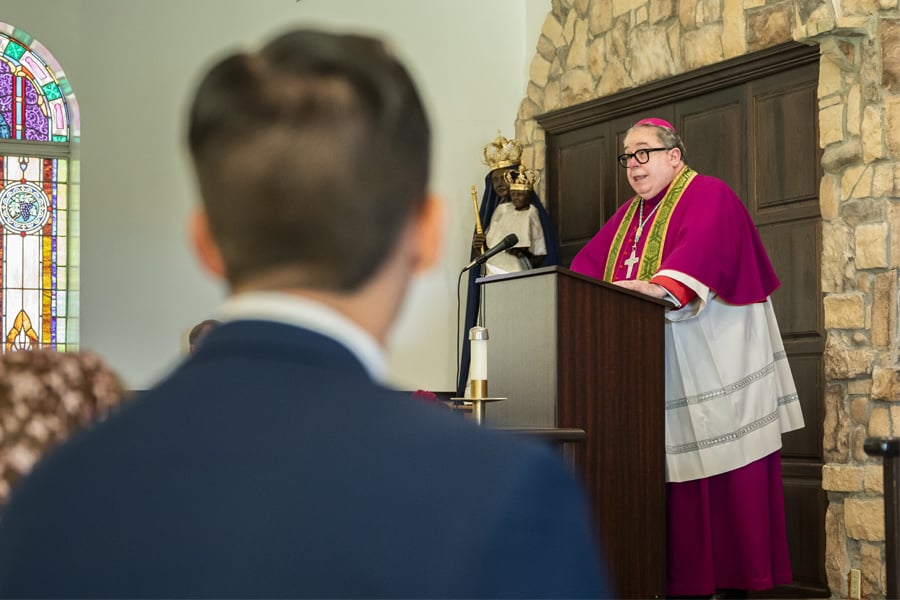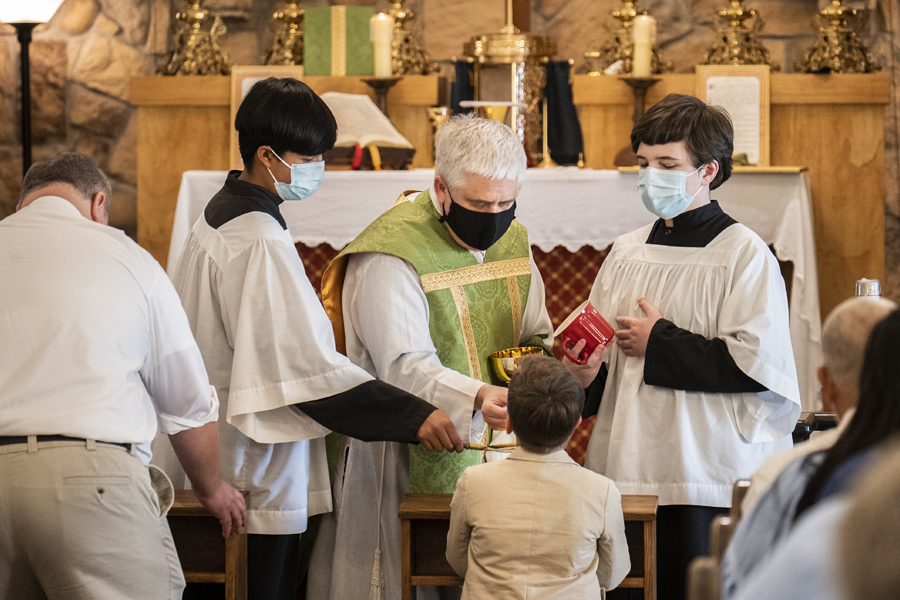A tradition of unity: Bishop Olson assures parishioners at St. Benedict Latin Mass will continue

Bishop Michael Olson delivers his homily at St. Benedict Parish on July 25, 2021. (NTC/Juan Guajardo).
Photo Gallery of St. Benedict Mass
FORT WORTH — Parishioners of St. Benedict Church in Fort Worth may continue to celebrate the Extraordinary Form of the Mass, also known as the traditional Latin Mass, in accordance with the 1962 Roman Missal.
That assurance, offered by Bishop Michael Olson during a homily given July 25 at the parish’s 11 a.m. Sunday Mass, answered concerns arising from Pope Francis’ newly imposed restrictions on the Tridentine (Latin) Mass. In a July 16 Apostolic Letter titled Traditionis Custodes (“Guardians of Tradition”), the Holy Father made sweeping changes to Pope Benedict XVI’s 2007 “Summorum Pontificum” decree allowing regular celebration of the Latin Mass. The new guidance gives bishops “exclusive competence” to grant permission or refusal for the traditional Latin Mass to continue in their dioceses. Added oversight, and a mandate to ensure groups attached to the traditional liturgy don’t deny the validity of Vatican II and its liturgical reforms, are also part of the document.
The Diocese of Fort Worth is already compliant with many of the provisions articulated in Traditionis Custodes, Bishop Olson told the congregation.
“I have the assurance of your pastor, and from my own judgment as ascertained through my pastoral visits, that St. Benedict Parish ‘does not exclude the validity and legitimacy of the liturgical reform of the dictates of the Second Vatican Council and the Magisterium of the Supreme Pontiffs,” he said, authorizing the celebration of the Mass using the 1962 Missal of Pope Saint John XXIII.
The bishop also voiced support for Father Karl Pikus, of the Priestly Fraternity of Saint Peter, who will continue as St. Benedict’s pastor. Praising Fr. Pikus’ pastoral charity and sense of ecclesial communion, Bishop Olson deemed him suitable for the position of pastor, citing the priest’s knowledge of the Latin language that allows him to fully understand the rubrics and liturgical texts of the Tridentine Mass. A member of the Diocesan Presbyteral Council, Fr. Pikus serves on the bishop’s College of Consultors.
“The pastoral leadership and service of Fr. Pikus and the assistance of Father J. Peter Bryne, as members of the Priestly Fraternity of Saint Peter, have protected you from the wolves of dissidence and chaos,” the bishop pointed out. “These good priests helped you grow as a parish through the preaching of the authentic Gospel, the celebration of the Mass and each of the sacraments with reverence, true piety, and love.”
The full text of Bishop Olson's homily is available on his blog, FortWorthBishop.org.
Established in 2015 by Bishop Olson to serve the Latin Mass community, St. Benedict started with 35 registered families at its founding and has grown to 140 families today. All reside within the geographical territory of the diocese in accordance with Canon Law, the bishop stated.
“As St. Benedict is canonically erected for the benefit of these faithful, I have carried out an appropriate assessment of its actual usefulness for spiritual growth and judge it should be maintained and it should flourish,” the bishop asserted.
The leader of North Texas Catholics asked parishioners to resort to prayer — not social media — for comfort during these challenging times.

Father Karl Pikus, FSSP, pastor of St. Benedict Parish, distributes Communion during Latin Mass on July 25, 2021. (NTC/Juan Guajardo).
Prompted by fears and distractions, “we can run the risk of succumbing to the temptation not to recognize gratefully what God has given us in His Son and His Son’s presence in the celebration of the Mass both in the Usus Antiquior (the ancient usage) and in the Ordinary Form of the Rite,” the bishop said.
In addition to mandating bishops ensure that faith communities celebrating the Latin Mass “do not deny” the liturgical reforms of Vatican II, the document prohibits the building of personal parishes or the use of parochial churches for Latin Mass groups, requires Scripture readings be proclaimed in the vernacular language, and instructs bishops to choose a delegate to oversee the pastoral care of Latin Mass participants. Priests ordained after July 16, 2021, must obtain permission from the Vatican to celebrate the Extraordinary Form of the Mass and veteran priests must request authorization from their bishop to continue celebrating the Latin liturgy. The formation of new Latin Mass groups is prohibited.
In a letter to bishops, Pope Francis said restrictions to the Latin Mass outlined in Traditionis Custodes were needed to restore unity of the Church. The pontiff’s decision was made after discussions with bishops around the world revealed a situation “that pains and worries me, confirming the need to intervene.”
“An opportunity offered by St. John Paul II and, with even greater magnanimity, by Benedict XVI, intended to recover the unity of an ecclesial body with diverse liturgical sensibilities, was exploited to widen the gaps, reinforce the divergences, and encourage disagreements that injure the Church, block her path, and expose her to the peril of division,” he wrote.
Use of the 1962 Roman Missal by some groups led to a “growing rejection not only of the liturgical reform, but of the Second Vatican Council, with the unfounded and unsustainable assertion that it has betrayed tradition and the true Church.”
